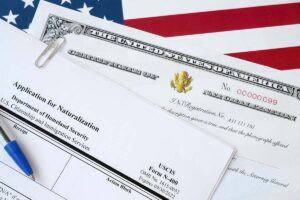
How a Notary Agent Takes Fingerprinting to the Next Level!
Introduction
In today’s world, fingerprinting plays a crucial role in various fields, ranging from crime investigation to identity verification. It serves as a unique identifier, enabling accurate recognition and authentication of individuals. One key player in this process is the notary agent, who brings a new level of expertise and professionalism to fingerprinting services.
Understanding Fingerprinting
Fingerprint identification is rooted in the science of dermatoglyphics, which focuses on the study of skin ridge patterns. These patterns are formed during fetal development and remain unchanged throughout a person’s lifetime. The intricate nature and uniqueness of fingerprints make them indispensable in identifying individuals and linking them to specific actions.
Throughout history, fingerprinting techniques have significantly evolved. From ancient civilizations’ use of fingerprints as signatures to the establishment of standardized identification systems, fingerprinting continues to shape the field of criminal justice. Over time, technological advancements have enhanced the accuracy and efficiency of fingerprinting, making it an invaluable tool in solving crimes and ensuring justice.
Importance of Accurate Fingerprinting
Accurate fingerprinting holds immense importance in crime investigation and prevention. By analyzing fingerprints left at crime scenes, forensic experts can establish a connection between suspects and criminal activities. This vital evidence helps in building strong cases that stand up in court. Moreover, accurate fingerprinting aids in the timely identification of criminals, preventing future offenses and protecting innocent individuals from false accusations.
To ensure a fair justice system, it is crucial to maintain the highest level of accuracy and reliability in fingerprinting processes. Errors or inaccuracies can have severe consequences, leading to the wrongful conviction or release of individuals. Notary agents, with their expertise and attention to detail, play a significant role in upholding the integrity of fingerprinting and the justice system as a whole.
Types of Fingerprints
There are three primary types of fingerprints: loops, whorls, and arches. Each type possesses distinctive characteristics and requires specific identification methods.
Loops: Loops are the most common type of fingerprint, characterized by one or more ridges that enter on either side, curve, and exit on the same side. These fingerprints often have a core, a central point from which the ridges flow.
Whorls: Whorls feature circular or spiral patterns. They contain at least one ridge that makes a complete circuit, often forming a circular or oval shape. Whorls can be classified as plain, central pocket loop, double loop, or accidental, depending on their specific patterns.
Arches: Arches are the rarest type of fingerprint, characterized by ridges that enter on one side and exit on the other without forming any consistent pattern. They can be further classified as plain arches or tented arches based on their specific ridge flow.
Identifying the type of fingerprint helps forensic experts narrow down potential matches and enhance the accuracy of the identification process.
Notary Agent: A Game-changer in Fingerprinting
Notary agents bring an innovative and professional approach to fingerprinting services. As skilled professionals, they are well-versed in the legal aspects and requirements surrounding fingerprinting. Notary agents specialize in providing accurate and reliable notarized fingerprints, serving as a bridge between individuals and the legal system.
Traditional Fingerprinting vs. Notary Agent Approach
Traditional fingerprinting methods often involve law enforcement agencies or government entities. Notary agents, on the other hand, offer a more personalized and convenient approach. They prioritize individual needs, ensuring a smooth and efficient fingerprinting process. By simplifying the procedures and streamlining the paperwork, notary agents are transforming the way fingerprinting services are delivered.
The benefits and advantages of choosing a notary agent for fingerprinting services are numerous. Notary agents offer flexibility in terms of scheduling appointments, making the process more accessible for individuals with busy lifestyles. Moreover, their knowledge and expertise enable them to handle complex situations and provide expert guidance throughout the fingerprinting process.
The Role of Notary Agents in Fingerprinting
Notary agents play a crucial role in facilitating the fingerprinting process. They are responsible for accurately capturing and documenting individuals’ fingerprints, ensuring they meet the necessary legal standards. By performing these tasks with precision and adhering to strict protocols, notary agents provide reliable evidence and trustworthy documentation to support legal proceedings.
As legal professionals, notary agents undergo certification processes and adhere to specific legal requirements. This certification guarantees their ability to provide notarized fingerprints that hold legal weight. By including notary agents in the fingerprinting process, individuals can be confident that their fingerprints will withstand legal scrutiny and contribute to the fair administration of justice.
Cutting-edge Technology Empowering Notary Agents
Technological advancements have revolutionized fingerprinting processes, empowering notary agents to provide efficient and accurate services. By harnessing cutting-edge technology, notary agents can further enhance their capabilities and streamline the fingerprinting experience for their clients.
Digital Fingerprinting: A Boon for Notary Agents
Digital fingerprinting has emerged as a game-changer in the field of fingerprint identification. Unlike traditional ink-based methods, digital fingerprinting captures high-resolution images of fingerprints using electronic scanners. This not only ensures better image quality but also allows for easy storage and retrieval of fingerprint records.
Notary agents leverage the advantages of digital fingerprinting to provide swift and accurate results. By eliminating the need for ink or paper, digital fingerprinting reduces the margin for errors and enhances efficiency. Additionally, digital records can be securely stored in databases, enabling quick access and retrieval when required.
Biometric Authentication and Notary Agents
Biometric authentication systems, such as fingerprint recognition technology, have gained traction across various industries. Notary agents capitalize on these advancements by incorporating biometric authentication into their fingerprinting services. By utilizing specialized biometric scanners, notary agents can verify the identity of individuals based on their unique fingerprints.
The integration of biometric authentication in notary agent services enhances security and efficiency in the fingerprinting process. It ensures that only authorized individuals are involved in the identification and verification procedures, minimizing the chances of identity theft and fraudulent activities.
Streamlining Fingerprinting Procedures with Notary Agents
Notary agents excel at simplifying the often time-consuming fingerprinting procedures. By offering on-site and mobile services, they prioritize convenience and accessibility for their clients.
On-site Notary Agents: Convenience and Accessibility
On-site notary agents bring their expertise directly to various locations, including offices, banks, or residential premises. This convenience eliminates the need for individuals to visit specific fingerprinting facilities, saving time and resources. On-site notary agents ensure a seamless experience by minimizing disruptions to daily routines and meeting individuals’ needs at their preferred locations.
Mobile Notary Agents: Breaking Barriers
Mobile notary agents go a step further in breaking barriers and accommodating individuals with mobility constraints. They ensure that anyone, regardless of their physical limitations, can access reliable fingerprinting services. By operating from customized vehicles equipped with all necessary equipment, they overcome geographical limitations and reach diverse populations.
The ability of mobile notary agents to provide services in remote areas, such as rural communities or correctional facilities, enhances accessibility and ensures that individuals from all walks of life can avail themselves of fingerprinting services.
Collaboration with Law Enforcement and Government Agencies
Notary agents play a crucial role in collaborating with law enforcement and government agencies to meet their unique fingerprinting requirements.
Accreditation and Collaboration with Law Enforcement
Accreditation is of utmost importance for notary agents, as it establishes their credibility and expertise in the field. Accredited notary agents work closely with law enforcement agencies to ensure compliance with legal standards and protocols. This collaboration enables seamless integration of notarized fingerprints into the broader criminal justice framework.
By maintaining strong relationships and open lines of communication, notary agents and law enforcement agencies work together to ensure accurate and timely fingerprinting services, contributing to effective crime investigation and prevention.
Notary Agents Supporting Government Agencies
Government agencies often require fingerprints for various purposes, such as background checks, immigration processes, or licensing requirements. Notary agents offer specialized services to support these agencies in fulfilling their fingerprinting needs. They assist in collecting, notarizing, and certifying fingerprints in accordance with legal requirements and regulations.
Through their collaboration with government agencies, notary agents strengthen public services and contribute to maintaining compliance with legal and administrative frameworks.
Ensuring Privacy and Data Security
Notary agents prioritize privacy and data security to instill confidence in their clients during the fingerprinting process.
Strict Privacy Policies for Notary Agents
Privacy policies and regulations guide the actions of notary agents, ensuring the protection of clients’ confidential information. These policies outline the measures taken by notary agents to safeguard personal data and ensure its limited disclosure. By adhering to strict privacy guidelines, notary agents provide individuals with peace of mind, knowing that their information remains confidential.
Data Encryption and Storage: Safeguarding Identities
Notary agents employ robust data encryption and secure storage systems to protect collected fingerprint data. Encryption ensures that digitized fingerprint records remain inaccessible to unauthorized individuals, adding an extra layer of security. Secure storage systems further safeguard identities by preventing the loss or theft of sensitive data.
By implementing these stringent data security measures, notary agents eliminate concerns regarding the misuse or compromise of fingerprint data.
Future Possibilities: Innovations on the Horizon
The field of notary agent fingerprinting is constantly evolving, presenting exciting possibilities for the future.
Fingerprint Recognition Technology Advancements
Advancements in fingerprint recognition technology show promise for further enhancing the accuracy and efficiency of fingerprinting processes. Emerging technologies, such as 3D fingerprint imaging and machine learning algorithms, offer greater precision in fingerprint matching and identification.
These advancements hold the potential to revolutionize the field, improving the speed of fingerprint analysis, and enabling more accurate identifications in complex cases.
Notary Agents in the Digital Age
The digital age opens up new possibilities for notary agent services. Remote fingerprinting and online certification could become viable options, enabling individuals to complete the fingerprinting process from the comfort of their own homes or offices. Integrating notary agent services with digital platforms will streamline processes, ensuring convenience and efficiency in the digital era.
As technology continues to advance, notary agents will be at the forefront, exploring innovative ways to transform fingerprinting services and meet evolving societal needs.
Summary
Notary agents bring a unique and professional approach to fingerprinting services. By combining their expertise with cutting-edge technology, they revolutionize the fingerprinting experience. From accurate and convenient on-site services to the integration of biometric authentication, notary agents streamline processes, enhance security, and prioritize individual needs. Their collaboration with law enforcement and government agencies further strengthens the value they bring to the field of fingerprinting. With a focus on privacy and data security, notary agents ensure individuals’ information remains confidential and protected. As the future unfolds, the possibilities for innovations in notary agent fingerprinting are vast, promising even more accurate and efficient identification processes.
FAQs: Uncovering Answers to Common Questions
Fingerprinting services provided by notary agents are typically admissible in court. Fingerprint evidence holds substantial weight and is widely recognized as a reliable method of identification. However, the specific admissibility of fingerprint evidence may depend on jurisdictional regulations, the circumstances surrounding its collection, and the qualifications of the notary agent or expert presenting the evidence.
The time required to obtain fingerprint results can vary depending on several factors, including the purpose of fingerprinting and the efficiency of the notary agent's processes. In many cases, results can be obtained within a matter of days. However, certain contexts, such as extensive background checks or international cooperation, may prolong the process.
Fingerprinting services can indeed be used for international purposes. Many countries require fingerprints for immigration, visa applications, and cross-border transactions. Notary agents well-versed in international requirements can assist individuals and businesses in obtaining fingerprints and ensuring their compliance with international standards and regulations.
In the rare event of an error in the fingerprints, notary agents take immediate action to rectify the situation. They may conduct an additional round of fingerprinting to obtain accurate results or pursue other suitable avenues for resolution. Clear communication between the notary agent, the individual, and any relevant institutions is crucial in rectifying errors and ensuring the integrity of the fingerprinting process.
Note: This article is intended for informational purposes only and should not be considered as legal advice. Businesses should consult with legal professionals for specific advice related to their circumstances.
RECENT POSTS


Unveiling How Zaen Tax Saved Me from Overpaying Taxes — Shocking Revelation!

Why Seeking Professional Tax Consultation Could Be The Best Decision You’ve Ever Made!

Mistakes You Are Making By Not Using Our Notary Loan Signing Agent Service!

Why Our Notary Loan Signing Agent Service is the Best Solution for You!

Why Notary Services are the Secret Ingredient in Your Business

Why IRS Certified Acceptance Agents are Incredibly Important? The Answer Might Surprise You!

How Hiring a Certified Acceptance Agent Could Change Your Life with the IRS?

The Incredible IRS Pros They Don’t Want You to Know About – Certified Acceptance Agents!

Get Your ITIN Application Approved in No Time with Professional Help!

How to Unlock Tax Benefits You Never Knew You Were Entitled to With ITIN Application

Say Goodbye to Bad Credit Forever: Discover the Best Credit Repair Service!

Revealed: This is How You Can Improve Your Credit Score Overnight!

The Secrets to Easily Managing Immigration Forms Revealed by Notary Agent!

Frustrated with Immigration Forms? Not Anymore with this Notary Agent!

Ever Tried Fingerprinting Service by a Notary Agent? You Won’t Believe the Impact!

How a Notary Agent Takes Fingerprinting to the Next Level!

Ordained Minister or Notary Agent? Find Out Who Does What and Why You Need One!

The Unexpected Skills of a Notary Agent turned Ordained Minister

Can’t Wait to Get Your Passport Photos?? Zaen Tax Have you Sorted!!

Shocking facts about Employee Retention Credit service by a notary agent revealed

You won’t believe the incredible results this notary agent delivers with their ERC service!

This notary agent’s Employee Retention Credit service will blow your mind!

Are You Paying Too Much on Student Loans? This Notary Agent Can Help You Save!

Say Goodbye to Student Loan Debt Forever with the Revolutionary Notary Agent Method!

